Dreams Come True in Springfield, Missouri
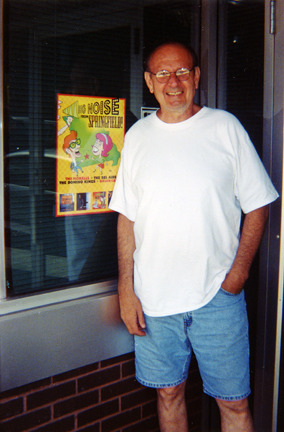
Happy Birthday Lou Whitney
January 10, 2013—
SPRINGFIELD, Mo.—-Lou Whitney props his feet up on the soundboard of his recording studio in downtown Springfield. The bass player-vocalist-producer has just finished his first show of 2013 with yet another version of the Skeletons, the most giving rock n’ roll band in America.
The Skeletons play regular two-hour Thursday sets which start at 7 p.m. at the Outland, a small rock club adjacent to Whitney’s studio. They start early because they have things to do.
Long time Skeletons keyboardist Joe Terry has to get up at 4:30 a.m. to open a coffee shop he manages in the soon-to-be-gentrified North Springfield. On this first Friday of 2013 Whitney is substitute teaching first grade at Portland Elementary in Springfield.
Skeleton music is a glorious blend of fire bells, gumdrops and life’s eternal recess.
They play Morells and Skeletons “hits,” along with an infectious new Terry original “Wishing Well” that is part Garth Hudson and part Elvis Costello. Covers range from drummer Bobby Lloyd Hicks’ “Tennessee Waltz,” a tribute to the recently departed Patti Page, a Band-like version of Bobby Charles’ “Small Town Talk,” a reggaeized cover of the 1969 hit “Ma Bella Mie” by the Dutch group Tee Set and a wild version of George Harrison’s “Wah-Wah” led by new guitarist Mark Bilyeu, the former lead songwriter of Big Smith.
The audience numbers 16 people.
We have paid $5 each to witness this unfiltered joy. If you like the early Beatles/Dave Clark Five, She and Him and NRBQ (another relentless band which most often gets compared to the Skeletons) you are here.
If you like to be happy, you are here.
One older fan has done work on the awnings of Whitney’s studio that were damaged in a recent storm. Another gentleman brings the band $50 certificates to a local art cinema house as a late Christmas present. These fans light up a night club that has seen better days.
The Outland’s walls consist of exposed brick and jagged crate. A deflated life size Jim Beam bottle sits on a shelf high above stage left. Somebody should really do something about that. A dead mirror ball hangs from the center of the room, all reflections covered in the dust of time.
Whitney turns 70 years old tomorrow. * * *
Lou Whitney has led a unique American journey.
Sweet Lou cut his chops on the Carolina Beach Music scene where he backed Arthur “Sweet Soul Music” Conley and Chicago’s late Major Lance. In 1977 his band the Symptoms hit New York radio with their cover of the Swinging Medallions Beach music hit “Double Shot (Of My Baby’s Love).” The band heard it on WNEW-AM on the way to a gig at the Peppermint Lounge.
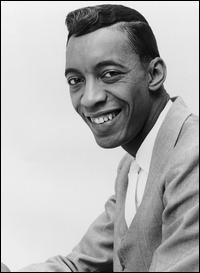
Major Lance
Whitney has produced and the Skeletons played on projects by the Del Lords, Robbie Fulks, Dave Alvin, Jonathan Richman, Steve Forbert, Syd Straw, late Branson hobo Boxcar Willie and most recently Exene Cervenka of X. Wilco’s “Why Would You Want To Live” from their 1996 “Being There” double album was recorded at The Studio.
One of the Skeletons biggest hits was the 1991 Bo Diddley influenced “Outta My Way,” which received airplay on Chicago’s WXRT-FM. Chicago’s most famous stripper Seka used “Outta My Way” in her routine. In 2003 Whitney and the Skeletons were Diddley’s band for his 2 and a half-hour set on his 75th birthday at FitzGerald’s in Berwyn, Ill.
“Maybe someday 50 years from now these Belgian guys and Japanese music fans will come by, ‘We’re looking for where ‘The Studio’ was, where all this happened,” Whitney says of the 1,700-square foot studio he opened in 1994 in a former cosmetic store. “And they’ll be told he died a long time ago.”
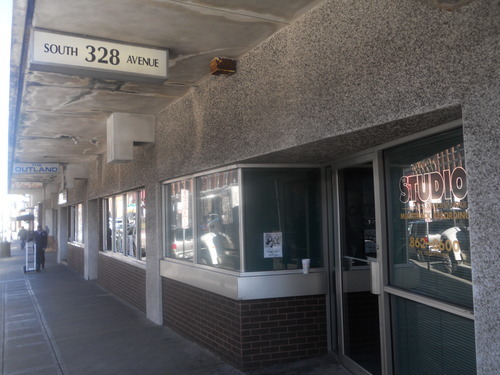
Springfield (pop. 160,000) is one of the most down-to-earth places in America.
* Springfield is the birthplace of Route 66.
In April, 1926 Tulsa oilman Cyrus Avery met with members of the Missouri State Highway Commission and others at the Colonial Hotel in Springfield about a newfangled 2,448-mile highway that would connect Chicago with the dreams of Los Angeles. The idea was to link the main streets of many small towns to create an interstate highway—thus the Route 66 tagline: “Main Street of America.” This small town ethic has defined Whitney’s music.
* During the mid-1950s’s the Springfield-based Ozark Jubilee was bigger than the Grand Ole Opry in Nashville, Tenn.
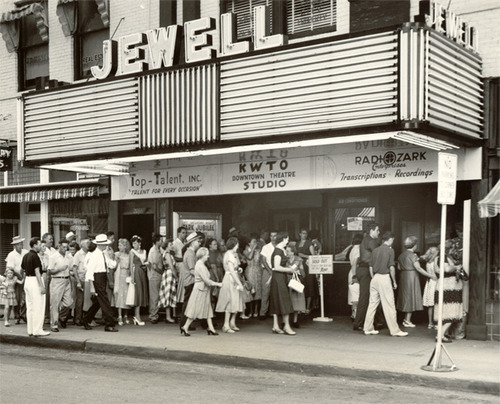
In line for the Ozark Jubilee, mid-1950s,
Courtesy of the Springfield Convention & Visitors Bureau
Country Music Hall of Famers Porter Wagoner and Brenda Lee got their starts on the Ozark Jubilee radio and television show broadcast live across America in the 1940s and 50s from downtown Springfield., a block east of Whitney’s studio. Chet Atkins was a studio guitarist for the Ozark Jubilee.
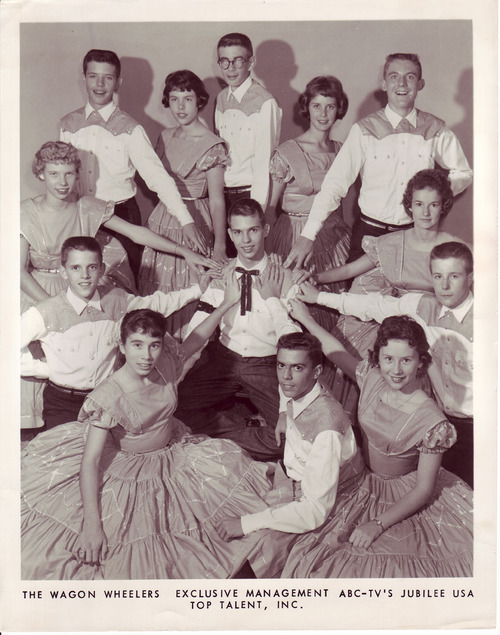
Springfield is no longer for squares
* Springfield is “The Cashew Chicken Capital of America,” with more than 100 restaurants that serve cashew chicken. Whitney moved to Springfield in 1970. He once explained how Pensacola, Fla. chef David Leong migrated to “The Queen City of the Ozarks” after World War II.
In the late 1960s a semi-truck plowed off of Route 66 into the kitchen of the now-defunct Grove Supper Club where Leong was working. Whitney told me this story in the summer of 2001. To demonstrate what happened, the 6’4” raconteur stood up from behind a desk in his studio and threw himself against a wall. Like Dick Butkus laying into Fran Tarkenton.
Still standing Whitney said, “David was pinned against the wall and suffered minor injuries. He ultimately got a settlement.” Leong opened his own restaurant with the settlement and became the Ray Kroc of Cashew Chicken. His unique style consisted of Chinese oyster sauce, chives and/or chopped scallions.
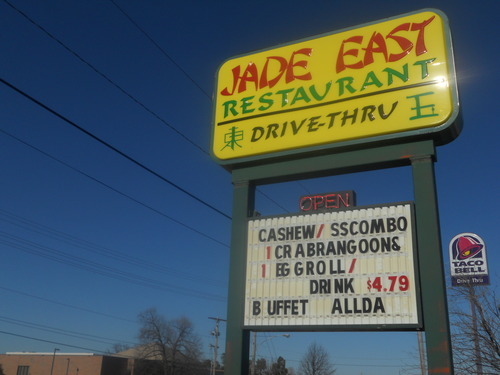
* Springfield is the “Buckle of the Bible Belt.”
For more than 15 years small groups of fundamentalist Christians march up and down on South Street, the major nightlife corridor in front of Whitney’s studio. They carry placards like “MUSIC STARS ARE IDOLS. GOD IS A JEALOUS GOD.” And “THIS PARTY ENDS IN HELL.” I’ve seen the Skeletons sing the haunting Ronnie Self (a Springfield native) blues anthem “Waitin’ For My Gin To Hit Me” with this religious backdrop. And Brad Pitt was raised in a Southern Baptist household in Springfield—before heading to the University of Missouri to study journalism!
This all stirs up a mighty stew of Americana.
“Springfield seemed like a lot of places to me,” Grammy winner Dave Alvin told me in a 2002 piece on Springfield I wrote for the Country Music Hall of Fame’s Journal of Country Music. “Part of it seemed like my hometown of Downey (California). I felt at home. Then there was a vibe that felt a little like Austin and Nashville. Everybody can play a lot of different styles. They’re pretty open-minded. In many ways it’s a western city, a southern city and a midwestern city.
“It’s kind of centrally located to be nowhere.”
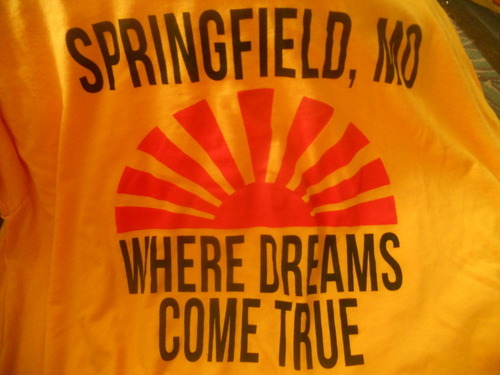
* * *
Lou Whitney, III was bassist-vocalist for the Symptoms (think Ramones meets Billy Lee Riley) between 1975-80. They began playing six nights a week in the “Pub Mobile” bar in Rolla, nowhere along Route 66 half way between St. Louis and Springfield. The subterranean bar was part of an automobile museum on a plot of land owned by guy who dated Donna Douglas.
She was “Elly Mae Clampett” on the Beverly Hillbillies.
You can’t make this stuff up.
The Symptoms morphed into the Morells in 1980 which later became the Skeletons, where pop and rock met Beach music. Drummer Hicks has been around for most of this. He counts the three bands among the 42 he has played in.
Whitney figures the Skeletons know “thousands” of songs.
“I graduated from high school in 1962,” Whitney says with a big smile. “My first two years I was a juvenile delinquent. That’s why I’m a good with kids. I can recognize one.”
Whitney is the grandson of Louis B. Whitney, the former mayor of Phoenix, Ariz. and an unsuccessful candidate for Congress on the Democratic ticket. Lou Whitney, Jr. was a successful Phoenix attorney who had trouble with the law and ordering of Lou Whitney III.
“I went to live with relatives up in the mountains near Bristol, Tennessee after I got in trouble,” Whitney says. “I straightened out and went to college.” Whitney obtained a degree in real estate at Eastern Tennessee University. “It’s a language, actually,” he says.
While in college Whitney joined bands that played soul music at frat parties from Tennesse through the University of Mississippi. He reflects, “Sure, I liked the Beatles, but soul music had horn sections, better melodies, there were poppy chord changes but with a big gospel voice.
“So I drag the Beach music stuff into this.”
Terry’s cresting keyboards amplify Whitney’s joyous Beach music rhythm. Hicks has a profound beat that is shaped in the ethic of bandleader Johnny Otis. Long time guitarist Symptoms-Morells-Skeletons guitarist D. Clinton Thompson currently is not performing live with the band, but he still plays sessions at Whitney’s studio when work is available.
Whitney admits that is rare these days.
“I’ll be 70!,” he says. “Even roots rock weirdos won’t come near me. It’s a young person’s business. But if you know anything about music, you know Donnie Thompson is one of the six best guitarists in America. It’s the quality here. You got guys like Bobby Lloyd Hicks, Joe Terry and Mark Biyleu. Those are my go to guys. They are down to earth, hard working and people you can count on. I stayed in Springfield because it would be hard to find any place where you could do better with more money. Guys in L.A. play good, of course, but the quality doesn’t get much better than this.”
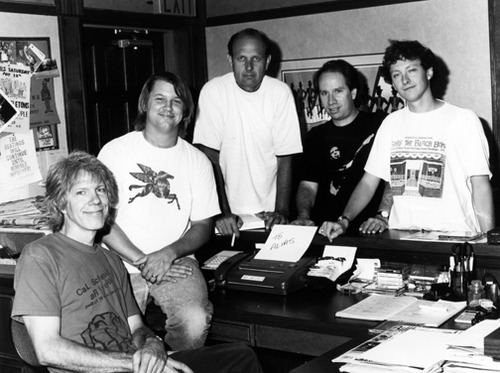
The Skeletons faxing their signed contract to Alias Records
* * *
The ‘Springfield Sound’ blends Beach music with rockabilly, surf and pop.
Is it a sound where musicians play with curiosity and generosity that could only come from the birthplace of Route 66?
“I’d say there is a Springfield attitude,” Whitney says with a whisper. “We are defenders of the song. It’s hard to put yourself outside of this, but if I put myself outside, I realize it is organic. It is musical. When we cut tracks everybody is playing. We do our share of overdubs, but it is live. Some people call it ‘unpolished,’ I would say it is a little more quaint. The people I associate with don’t go to a recording session to enhance their reputation. My guys get paid $250 a day. $250 a day! They come in and work their asses off and go beyond that, 12, 14 hours. If I have anything going on in the studio I want people to know all you have to do is work hard and you can make good music.”
Not long ago a trio of 14-year-old Springfield girls walked into The Studio asking for Whitney to record their tweener pop.
The girls call their group The Poverty All-Stars.
“My goal is to send them down the road knowing, ‘This can be done’,” Whitney explains. “I want their first recording to be the one they hold up as a benchmark for everything else they do. The punk rock bands come in and start talking about the Sex Pistols and I tell them I’m in the documentary DOA (A Rite of Passage, released in 1980). The Sex Pistols played Oral Roberts University in Tulsa and we were out there arguing (with the authorities). I can tell you about punk rock. I can tell you about the Ramones, we played with those guys.”
Whitney has been married for 22 years. He and his wife Kay Tolliver have seven grandchildren and two great-grandchildren.
Take that, Keith Richards.
It is not beneath Whitney to teach his grandkids some glossy Bruno Mars guitar chords. “And I keep playing live because it keeps your skill set up,” he says.
Whitney leans back in a chair and look around the dimly lit studio. It is nearing 11 o’ clock at night. He continues, “I am noticing some age things. I can’t jump around as much. But I still run three miles a day. I don’t feel any different. I don’t feel any different from a personality standpoint. You get down on your hands and knees to work on some painting, you get up and it’s ‘Oh fuck’. I’m not that excited about turning 70. I’m not doing anything for my birthday. Kay and I will do something. Don’t get me wrong. I’m glad to be here.”
Mainstream listeners may not know it, but American roots music is a happier place because of Lou Whitney. After the first time you hear the sound of his generous spirit, it becomes a benchmark of everything else that follows. Especially the warm moments that bring you joy, like bright candles on a birthday cake.
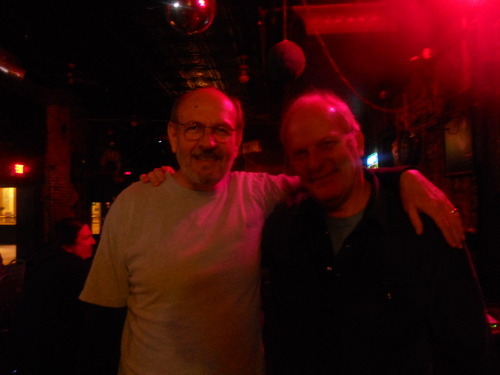 M
M
Me and Lou, January 2013


Leave a Response